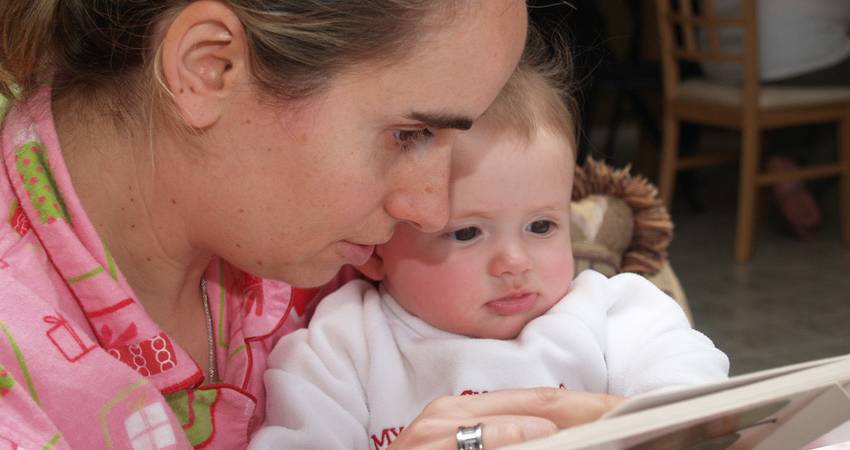
Early Learning: A Common Sense Approach
Children have a huge capacity to learn in the first three years of your life. This doesn’t mean that a baby should be able to pick up a book on algebra or Greek and advance in leaps and bounds. The type of learning we engage in up to the age of three is fundamental - the building blocks for later learning - and includes learning how to walk, how to make the sounds we use for speech, and how to reason. Young children have a special capacity for learning new concepts and behaviour, something that is recognised in the old saying ‘you can’t teach an old dog new tricks.’
A child’s brain grows most rapidly during the first year of life. So what can parents do to encourage brainy babies? The official answer is quite surprising.
Common sense is making a comeback. Dieticians are telling us not to eat so much. Financial advisors counsel against high-risk investments. And when it comes to child development, experts are taking a back-to-basics approach. The way to promote healthy brain growth in your child is not by playing classical music or buying fancy high-tech toys. It’s with lots of love, a stable home and caring, supportive adults.
The latest brain studies indicate that our basic nurturing impulses as parents give babies exactly what their growing brains want.
But all too often in our attempts to make our kids smarter with so-called brain-building gadgets, activity-filled schedules and complex computer games, we don’t make time for the types of personal interaction that promote the best environment for developing brains.Young children need hours of positive and attentive care-giving. This may seem obvious to many parents. But research and an emphasis on early brain development in the mid-1990s led many parents to feel pressured to capitalize on every learning opportunity for their infants and toddlers. The result was a notable increase in high-tech learning toys, classical music recordings and structured play and learning programs. Now the experts are revising this wisdom and advise more of the traditional parenting of just being there in those crucial early years.
To understand the link between early emotional bonding and brain development, it helps to know what’s going on in your baby’s brain. You may have heard that a baby’s brain grows most rapidly during the first three years of life. During the first year, brain cells are busy making millions of connections. The connections peak at about one year and, in a process called “pruning,” they are eliminated if they are not used. The connections that you regularly use are the ones that you keep.
Parents’ efforts to bond with their child strengthen healthy connections. As a parent, you know that your child depends on you for survival. What you may not realize is just how influential you are to your child’s growing brain.
Children who are talked with, held, rocked, listened to, and who have their curiosity answered by present and attentive caregivers, do very well.
Loving, cuddling, hugging - that all sounds wonderful for babies. And the obvious place to start is the home. Parents with only one child may find it harder to entertain that child, than parents of several children, while siblings can often entertain themselves.
This is the first grounding a child has in networking and forming relationships outside that maternal bond with his/her mother. There comes a time in every parent’s life when you need to turn your child over to the world. If you’ve created a foundation of a stable home the child will fare much better and possibly avoid the pitfalls of peer pressure and risky behavior.
Recent research from The Search Institute, a non-profit US based organization which works to advancing the well-being of adolescents and children, showed that the best stimulus for children is attention and love. One of the researchers, Sandra Harris, put it like this:
‘A good approach has adults intentionally – and that’s the key – interact and be a part of children’s lives in a way that will help them succeed. Smile at them. Notice them, learn their names. It’s common sense – but it’s not common behaviour.
So we seem to have come full circle. Common sense is now what’s recommended by early-childhood experts. Loving our children, playing with them, reading to them – it turns out that the simple pleasures we can share with our kids are building blocks of brain development. Again and again, we’ve all heard that as parents we should follow our instincts. Our instincts are right.
Featured
- Abortion coercion has arrived in Ireland – the NWC are silent
- Review of at-home abortions 'needed after coercion case'
- French Govt to remind 29-year-olds of biological clock
- Huge factor in decline in primary school numbers ignored
- Germany Denies Promoting Abortion Abroad—While Funding Pro-Abortion NGOs
- Govt don’t oppose Coppinger abortion bill at 1st stage
- March for Life: Vance, the White House, and a Divided Pro-Life Movement
- Paris’ Annual March for Life Puts Euthanasia in the Spotlight
- Britain’s seemingly limitless abortion rate
- The importance of the work carried out by Every Life Counts
- Puerto Rico officially recognizes unborn children as ‘natural persons’
- Assisted suicide laws stalled by “complex” legal issues
- Yes, that hideous celebration of 300 abortions is real
- White Crosses Memorial: Dungarvan once again pays its respects to our aborted babies
- Josiah: Abortion Survivor
- Rally for Life 2025


























